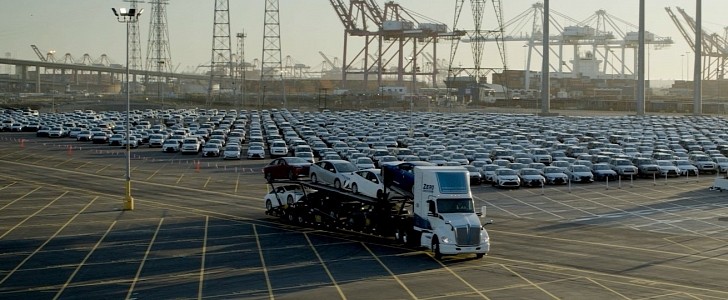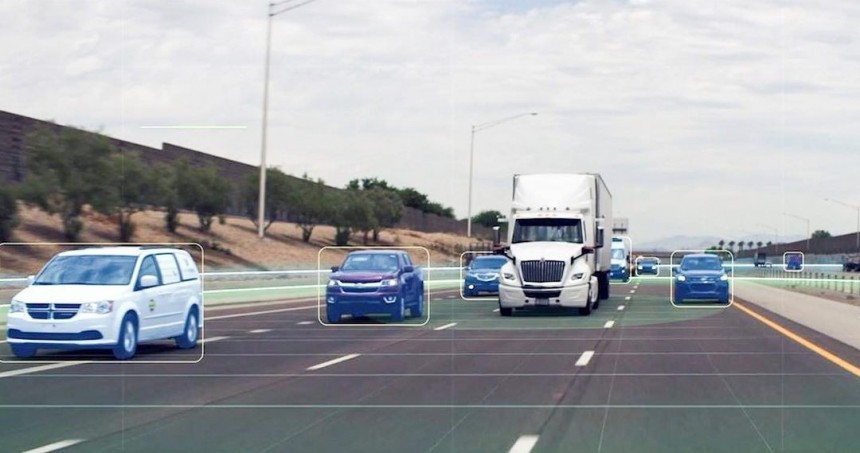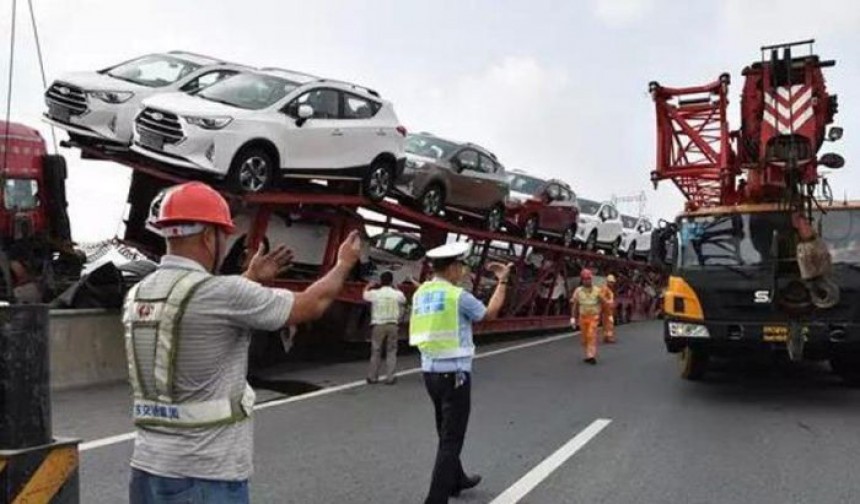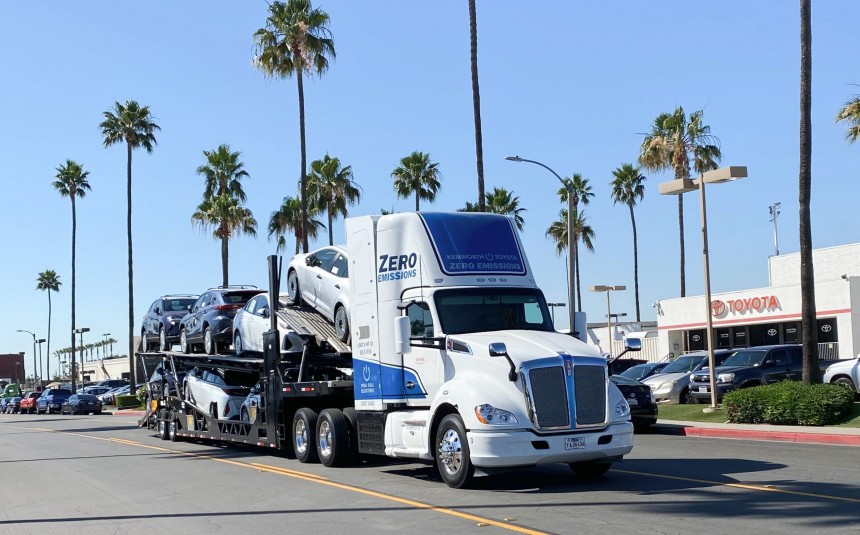Before your next vehicle arrives in a showroom, regardless of whether it is a used car or a new one, it will be transported with a truck that pulls a special kind of trailer, which is called a car trailer. Just like any other truck on the road, it has a weight limit, which limits the weight that can be legally towed. Now, those limits are being contested in the U.S. by large car-hauling companies. Why?
The current federal gross vehicle weight limit is 80,000 lbs. (36,287 kg), and anything above that becomes illegal to tow with an individual tractor-trailer that does not have a special permit for that purpose.
For example, if the Space Shuttle is being moved, a special permit will be required for its transport, and the same would apply to a Boeing 787 fuselage. In the latter case, but also in the former, since both are extremely long, tall, and wide, there are several reasons for the requirement of a special permit.
In the case of a car trailer full of brand-new vehicles, or one with used cars that were bought at a wholesale auction by an independent dealer, asking for special permits might be too expensive and too complicated, especially for regular shipments.
So, instead of attempting this, car hauling companies have turned to asking Congress to change the limits that were set back in 1975. Their request is to increase the federal gross weight restriction from 80,000 lbs. to 88,000 lbs. (39,916 kg), as Reuters informs.
As those of you with an eye for figures have noticed, they want to carry 10 percent more, or 8,000 lbs (3,629 kg). The motivation for the request is that EVs have increased weight over regular vehicles of the same size, which means that sticking to the old norms will involve cutting down on how many vehicles can be placed on a car trailer.
With the extra 8,000 lbs., the difference would account for a larger EV, or two small ones, if there is enough space on the trailer. It could also make the difference between having the possibility to add one last car to a trailer and have it full or leaving one position empty to stick with the rules.
As you can imagine, car hauling companies cannot just add as many EVs as they can fit on a trailer and call it a day, as the industry is regulated, and there are periodical checks on various routes to catch drivers who depart to their destination with more weight than they are allowed to carry.
Currently, there are people in Congress who claim that they are working to increase weight limits, but safety advocates warn that having even heavier trailers on public roads will make both more dangerous. It is simple physics, dear reader – a heavier trailer will be harder to stop, can be rolled over easier, and it will bring more damage to the road beneath it.
On the other hand, fewer cars in trucks will lead to more trips being taken to transport the same number of units and spending more money to do so, as well as increasing pollution through increasing the number of trips that need to be made.
By now, everyone with a driver's license has driven on a road that is frequently used by heavy trucks. These leave their wavy marks on the road, and driving a lighter vehicle, such as a light car or a motorcycle, will be increasingly difficult on surfaces like these, which means risking the health and integrity of the people in lighter vehicles because one of several car haulers has made asphalt melt under its trucks and trailers.
Both safety advocates and freight rail industry reps note that heavier vehicles will be more difficult to stop, will bring increased wear and tear on roads and bridges, and that this request will only benefit the trucking companies and not anyone else on the road.
It is important to point out that in states like California, there are temporary permits in place for trucks that carry goods in and out of ports so that there are no supply-chain bottlenecks in Los Angeles and Long Beach. Trucking companies are asking for a change on a federal level, so a standardized situation allows crossing state lines with extra weight.
Other possibilities include allowing higher weight limits for limited distances, in the idea that a trailer may drive from a shipyard to the nearest center with a larger weight limit, even the proposed one, and would then be allowed to move on at the current weight limit once one or two vehicles would be unloaded.
For a change, the consumers are not at fault for making everything worse in the world, but the situation is increasingly frustrating, as EVs are not going to become lighter (or at least as light as conventional vehicles) overnight. In other words, the described problem will hit other states (and countries) soon if it is not already happening, but nobody is talking about it.
So yes, your takeaway from this would be to always yield right of way to the incoming truck and make sure you do not make its driver hit the brakes hard or swerve to avoid your vehicle, as the situation might get nasty at a moment's notice. Just do not mess with vehicles that are significantly heavier than yours, as you may trigger something that nobody can control.
For example, if the Space Shuttle is being moved, a special permit will be required for its transport, and the same would apply to a Boeing 787 fuselage. In the latter case, but also in the former, since both are extremely long, tall, and wide, there are several reasons for the requirement of a special permit.
In the case of a car trailer full of brand-new vehicles, or one with used cars that were bought at a wholesale auction by an independent dealer, asking for special permits might be too expensive and too complicated, especially for regular shipments.
So, instead of attempting this, car hauling companies have turned to asking Congress to change the limits that were set back in 1975. Their request is to increase the federal gross weight restriction from 80,000 lbs. to 88,000 lbs. (39,916 kg), as Reuters informs.
With the extra 8,000 lbs., the difference would account for a larger EV, or two small ones, if there is enough space on the trailer. It could also make the difference between having the possibility to add one last car to a trailer and have it full or leaving one position empty to stick with the rules.
As you can imagine, car hauling companies cannot just add as many EVs as they can fit on a trailer and call it a day, as the industry is regulated, and there are periodical checks on various routes to catch drivers who depart to their destination with more weight than they are allowed to carry.
Currently, there are people in Congress who claim that they are working to increase weight limits, but safety advocates warn that having even heavier trailers on public roads will make both more dangerous. It is simple physics, dear reader – a heavier trailer will be harder to stop, can be rolled over easier, and it will bring more damage to the road beneath it.
By now, everyone with a driver's license has driven on a road that is frequently used by heavy trucks. These leave their wavy marks on the road, and driving a lighter vehicle, such as a light car or a motorcycle, will be increasingly difficult on surfaces like these, which means risking the health and integrity of the people in lighter vehicles because one of several car haulers has made asphalt melt under its trucks and trailers.
Both safety advocates and freight rail industry reps note that heavier vehicles will be more difficult to stop, will bring increased wear and tear on roads and bridges, and that this request will only benefit the trucking companies and not anyone else on the road.
It is important to point out that in states like California, there are temporary permits in place for trucks that carry goods in and out of ports so that there are no supply-chain bottlenecks in Los Angeles and Long Beach. Trucking companies are asking for a change on a federal level, so a standardized situation allows crossing state lines with extra weight.
For a change, the consumers are not at fault for making everything worse in the world, but the situation is increasingly frustrating, as EVs are not going to become lighter (or at least as light as conventional vehicles) overnight. In other words, the described problem will hit other states (and countries) soon if it is not already happening, but nobody is talking about it.
So yes, your takeaway from this would be to always yield right of way to the incoming truck and make sure you do not make its driver hit the brakes hard or swerve to avoid your vehicle, as the situation might get nasty at a moment's notice. Just do not mess with vehicles that are significantly heavier than yours, as you may trigger something that nobody can control.




































